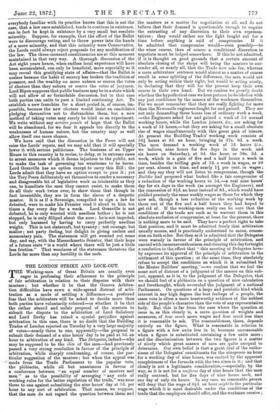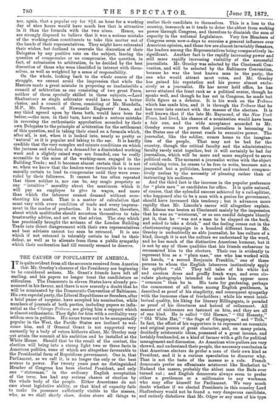THE LONDON STRIKE AND LOCK-01:7T.
THE Working-men of Great Britain are usually even eager in professing their adherence to the principle of fair arbitration in relation to their disputes with their masters ; but whether it be that the Geneva Arbitra- tion difficulties have sown a wide-spread distrust of arbi- tration as a mode of settling a difference—a profound fear that the arbitrators will be asked to decide more than both parties have voluntarily referred—or whether it be that the rather absurd and unfair proposal of the masters to submit the dispute to the arbitration of Lord Salisbury and Lord Derby has raised a special prejudice against arbitration in this case, there is no doubt that the Building Trades of London rejected on Tuesday by a very large majority of votes—nearly three to one, apparently—the proposal to submit their demand of a nine hours' day to be paid at 9d. an hour to arbitration of any kind. The Delegates, indeed—who may be supposed to be the elite of the men—had previously passed a very strong resolution in favour of the principle of arbitration, while sharply condemning, of course, the par- ticular suggestion of the masters ; but when the appeal was made from the Trade Parliament to the popular vote, the plebiscite, while all but unanimous in favour of a conference between "an equal number of masters and men" as to the possibility of arranging "any code of working rules for the better regulation of the trade," was near three to one against submitting the nine hours' day at 9d. per hour to any sort of arbitration. That means, we suppose, that the men do not regard the question between them and the masters as a matter for negotiation at all, and do not believe that their demand is questionable enough to require the entrusting of any discretion to their own represen- tatives; they would rather see the fight fought out for a time before anything is said of compromise. If it be admitted that compromise would—even possibly—be the wiser course, then of course a conditional discretion to negotiate must be lodged somewhere. If this be not admitted, if it is thought on good grounds that a certain amount of absolute closing of the shops will bring the masters to sur- render all, or nearly all, that the Trade now asks for, whereas a mere arbitrators' sentence would almost as a matter of course result in some splitting of the difference, the men would not only be acting within their right, but would be acting wisely, in declaring that they will for the present keep their own course in their own hand. But we confess we greatly doubt whether the hypothetical case we here put can be decided on with any just confidence by the masses of the workmen themselves. For we must remember that they are really fighting for more than the Newcastle engineers fought for and gained. They are not only demanding three hours less of ordinary work a week, —the Engineers asked for and gained a week of 54 normal working hours, while the London joiners, &c., are asking for a week of 51 hours,—bat they are asking for a small absolute rise of wages simultaneously with this great gain of leisure. At present the Building Trades' working week consists of 56i hours at 8d. an hoar, bringing in 37s. 8d. a week. The men demand a working week of 51 hours (i.e., we believe, nine hours for five days in the week, and six hours on Saturday), at 9d. the hour, or 38s. 3d. a week, which is a gain of five and a half hours a week in time, besides the trifling gain of 7d. a week in wages, or 10 per cent. almost in time, and nearly 1/ per cent. in wages ; and they say they will not listen to compromise, though the Builder had proposed what looked like a fair compromise of a reduction of the working hours to 54,—a real nine hours' day for six days in the week (as amongst the Engineers), and the concession of 81d. an hour instead of 8d., which would have yielded precisely the same weekly wages as those for which they now ask, though a leas reduction of the working week by three out of the five and a half hours they had hoped to get rid of. If the working-men really can be sure that the conditions of the trade are such as to warrant them in this absolute exclusion of compromise, at least for the present, there is nothing more to be said. They have a perfect right to take that position, and it must be admitted freely that arbitration usually means, and is practically understood to mean, conces- sion on both sides. But then as it is admitted that the Delegates were warmly in favour of the principle of arbitration, and carried with immense enthusiasm and cheezing this day fortnight a resolution to theeffect that "this meeting of Delegates here- by expresses its approval of the principle of arbitration in the settlement of this question ; at the same time, they absolutely refuse to accept the conditions on which it is submitted by the Master Builders' meeting,"—we confess that we feel the same sort of distrust of a judgment of the masses on this sub- ject, opposed, as it is, to the judgment of the Delegates, that we should feel of a plebiscite on a question of nice calculation and forethought, which overruled the judgment of a national Parliament. On questions of a large and patriotic kind which interest in any high degree the best feelings of a people, the mass vote is often a more trustworthy evidence of the noblest aide of the people's character than the vote of any representative body. But this is far from the case where the question at issue is, as this clearly is, a mere question of weights and measures, of how much more wages and how much less time it is reasonable to ask. The reasonableness, there, depends entirely on the figure. What is reasonable in relation to a figure with a few units less in it, becomes unreasonable when a figure is substituted containing a few units more; and the discrimination between the two figures is a matter of nicety which great masses of men are quite unequal to determine. Our own belief is that a great deal of the enthu- siasm of the Delegates' constituents for the ninepence an hour for a working day of nine hours, was excited by the apparent completeness of the formula with the two nines in it ; and that clearly is not a legitimate consideration,—especially, by the way, as it is not for a uniform day of nine hours that the men really contend, but for five days of nine hours each, and one day of only six hours. In any case, no reasonable person will deny that the wage of 81d. an hour might be the particular wage which it is most desirable under the conditions of the trade that the employers should offer, and the workmen receive ; nor, again, that a popular cry for 8id. an hour for a working realise their candidate to themselves. This is a loss to the day of nine hours would have much less that is attractive country, inasmuch as it tends to defer the ablest from seeking in it than the formula with the two nines. Hence, we power through Congress, and therefore to diminish the sum of are strongly disposed to believe that it was a serious mistake capacity in the national Legislature. Very few Members of of the working-class constituents to take this matter out of Congress seem now-a-days to exercise a general influence over the hands of their representatives. They might have reiterated American opinion, and those few are almost invariably Senators, their wishes, but declined to overrule the discretion of their the leaders among the Representatives being comparatively in. Delegates by any positive vote on the subject, leaving the significant. Another fact is the rapidly increasing power and question of compromise or no compromise, the question, in still more rapidly increasing visibility of the successful fact, of submission to arbitration, to be decided by the best journalists. Mr. Greeley was selected by the Cincinnati Con. discretion of those who were identified in interest with them- vention, and will be selected by the Baltimore Convention, selves, as well as weighted by a sense of responsibility. because he was the best known man in the party, the
that there neither is, nor can be, any magic propriety or And the third fact is the increase in the popular preference any " intuitive " morality about the maximum which it for "plain men" as candidates for office. It is quite natural, will pay an employer to give in wages, and more of course, that the splendid success achieved by a rail-splitter, than which the labourer cannot demand without over- who happened also to be a man with a genius for government, shooting his mark. That is a matter of calculation that should have increased this tendency ; but it advances more must vary with every condition of trade and every improve- rapidly than Mr. Lincoln's career will altogether explain. meat in the modes of production. It is a matter, therefore, Mr. Adams was beaten at Cincinnati mainly by the impression about which multitudes should accustom themselves to take that he was an "aristocrat," or as one candid delegate bluntly trustworthy advice, and act on that advice. The step which put it, that he "was not a man to be slapped on the back, has practically brought the artisans of the London Building and asked to take a drink," and the feeling comes out in the Trade into direct disagreement with their own representatives electioneering campaign in a hundred different forms. Mr. and best advisers cannot too soon be retraced. It is one Greeley is undoubtedly an able journalist, he has culture of a which if not retraced is tolerably certain to lead to their kind, though it is not the culture we understand by the word, defeat, as well as to alienate from them a public sympathy and he has much of the distinctive American humour, but it



































 Previous page
Previous page